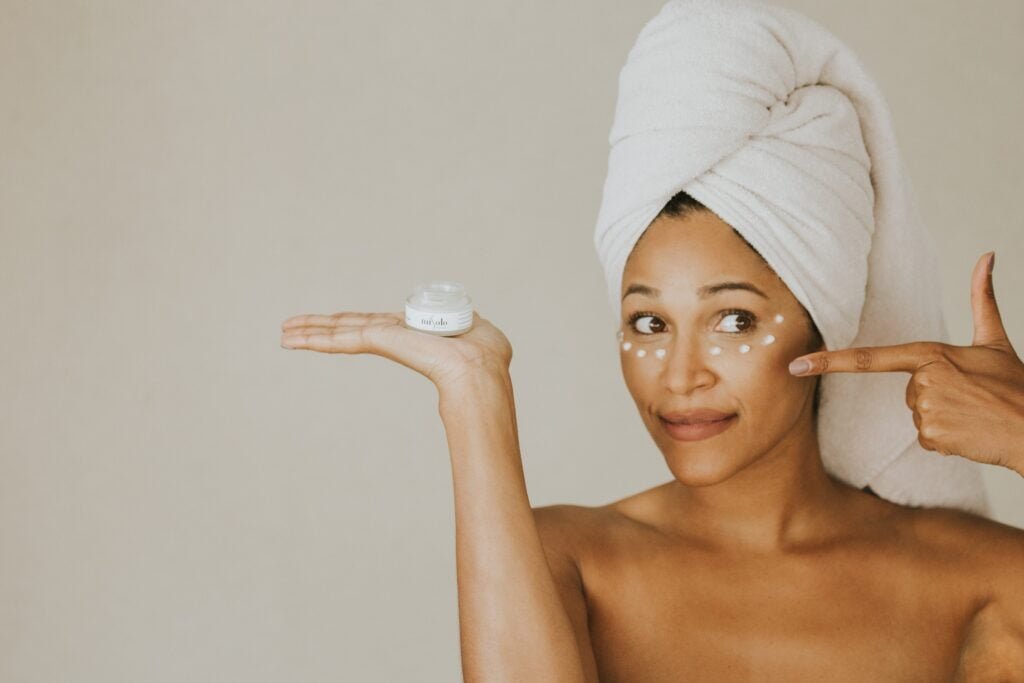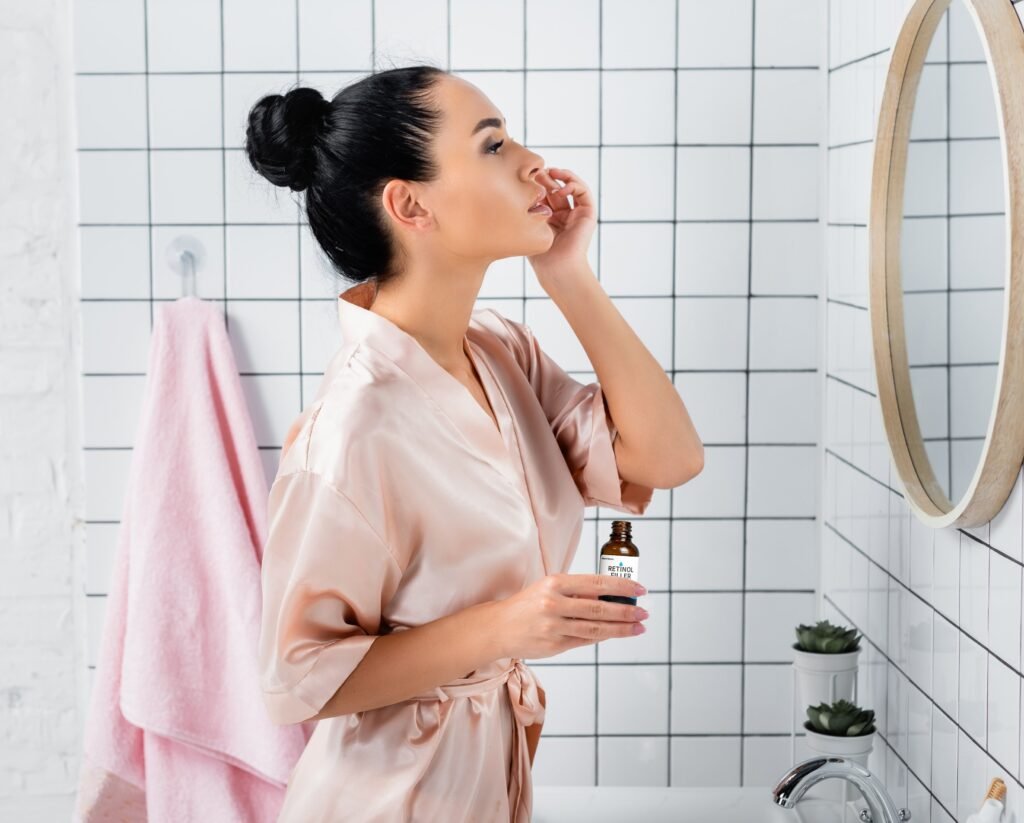AT WHAT AGE SHOULD I START USING RETINOL? The question of when to start using retinol is a hot topic that garners attention from skincare enthusiasts and experts alike.
Retinol, a derivative of vitamin A, has established its reputation as a game-changer in skincare routines, offering a slew of benefits ranging from fighting acne to reducing fine lines and wrinkles.
But at what age should one consider introducing this powerhouse ingredient into their skincare routine?
Let’s delve into the nuances of this commonly asked question.
Some of the links in this post are affiliate links. This means if you click on the link and purchase the item, I will receive an affiliate commision at no extra cost to you. All opinions remain my own. Read more on our Privacy Policy page
>> Murad Retinol Youth Renewal Serum – view on amazon

Why Use Retinol?
Before discussing the right age to start using retinol, it’s essential to understand its benefits. Retinol is a potent ingredient known for promoting skin renewal, enhancing collagen production, and improving the appearance of signs of aging. Its versatility makes it an appealing choice for various skincare concerns, including acne, hyperpigmentation, and skin texture.
Why Use Retinol?
- Promotes Skin Renewal:
- Retinol accelerates the process of skin cell turnover. This helps new skin cells replace old ones, leading to a more youthful and vibrant appearance.
- Enhances Collagen Production:
- Collagen is essential for maintaining skin’s elasticity and firmness. Retinol boosts the production of collagen, thereby reducing the appearance of fine lines and wrinkles.
- Fights Acne:
- By unclogging pores and reducing inflammation, retinol can be an effective treatment for acne and post-acne scars. It often works in tandem with other acne treatments for a more comprehensive solution.
- Improves Skin Texture:
- The increased rate of cell turnover also contributes to a smoother skin texture. This can be particularly beneficial for individuals dealing with rough or uneven skin.
- Reduces Hyperpigmentation:
- Retinol can lighten age spots, sun spots, and melasma by dispersing melanin granules that cause pigmentation and by promoting the creation of new, healthier skin cells.
- Minimizes Pore Size:
- By keeping pores clear, retinol helps to reduce their appearance, leading to a more refined skin texture.
- Anti-Inflammatory Properties:
- Some formulations of retinol come with anti-inflammatory benefits, which can be particularly useful for skin conditions like rosacea.
- Works Well with Other Ingredients:
- Retinol can be combined with other beneficial skincare ingredients like hyaluronic acid, but it’s crucial to do so carefully to avoid skin irritation. Consult a dermatologist for personalized advice.
- Broad-Spectrum Benefits:
- Because it addresses a wide range of skin concerns, from acne to aging, retinol is often considered a multi-tasking ingredient in skincare routines.
- Backed by Research:
- One of the most studied skincare ingredients, retinol has been proven effective in multiple scientific studies, lending credibility to its benefits.
- Versatility:
- Retinol comes in various formulations and concentrations, making it adaptable to different skin types and concerns. Whether in a cream, serum, or prescription form, there’s likely a retinol product suitable for you.
- Long-Term Benefits:
- Consistent and correct use of retinol can offer long-term benefits, including more resilient and healthier-looking skin over time.
Anti-AgiNG Skin Care Routine in your 50s
Using retinol comes with its own set of rules and considerations, such as potential irritation and the need for increased sun protection. However, its myriad benefits make it a valuable addition to many skincare regimens when used responsibly. Always consult a dermatologist to tailor a retinol routine that’s best for your skin type and needs.

AGE You SHOULD START USING RETINOL
Deciding the right age to start using retinol is not a one-size-fits-all answer; it depends on a variety of factors including skin type, skin concerns, and personal skincare goals. Here’s a more in-depth look at different life stages and how retinol might fit into your skincare routine:
Teen Years:
- Acne and Breakouts: If you are a late teen dealing with persistent acne, retinol may be a consideration. It can help unclog pores and reduce acne marks.
- Dermatologist Consultation: Due to the potent nature of retinol, it’s essential to consult a dermatologist for proper advice, especially if you’re under 18.
- Alternative Treatments: Retinol is not always the first line of defense for teen skin. Milder treatments, like benzoyl peroxide or salicylic acid, are often recommended initially.
Late 20s to Early 30s:
- Early Signs of Aging: This is the age range where many people begin to notice the first signs of aging like fine lines and reduced skin elasticity.
- Preventative Measures: Starting retinol at this stage can be more of a preventative measure to delay the onset of more noticeable signs of aging.
- Building a Routine: As you enter your late 20s and early 30s, your skin’s ability to recover starts to slow down. Incorporating retinol can aid in boosting cell turnover.
40s and Beyond:
- Advanced Signs of Aging: If you didn’t start using retinol earlier and you’re experiencing more evident signs of aging, it’s not too late to start.
- Higher Concentration Options: Older skin may benefit from a stronger concentration of retinol, but this should be introduced gradually and ideally under a dermatologist’s supervision.
- Skin Elasticity and Wrinkles: Retinol can particularly help improve skin elasticity and reduce the appearance of deeper wrinkles and age spots at this age.

Additional Factors:
- Skin Sensitivity: Your skin’s tolerance level plays a significant role in when you can start using retinol. Some people have more resilient skin that can handle retinol at an earlier age.
- Lifestyle Considerations: Factors like sun exposure, smoking, and diet can also impact when you might want to start using retinol.
- Pregnancy and Breastfeeding: During these stages, the use of retinol is generally not recommended. It’s crucial to consult healthcare providers for safe skincare routines during this period.
Key Takeaway:
The age you should start using retinol largely depends on individual circumstances. By identifying your skincare needs and consulting a dermatologist, you can determine the most appropriate age for you to introduce this powerful ingredient into your regimen. Whether for acne, preventive anti-aging, or more advanced skincare needs, retinol offers a range of benefits suitable for different life stages.

Important Considerations Before Using Retinol
- Consult a Dermatologist: Always consult a healthcare professional before introducing potent active ingredients like retinol into your skincare routine.
- Start Slow: Begin with a low concentration and use it sparingly, perhaps every 2-3 nights, to gauge how your skin reacts.
- Skin Sensitivity: Sun protection is crucial when using retinol, as it makes your skin more susceptible to UV damage. Always use a broad-spectrum sunscreen during the day.
- Pregnancy and Breastfeeding: Retinol is generally not recommended during these periods. Always check with your healthcare provider for alternatives.
- Patch Test: Conduct a patch test to ensure the product doesn’t irritate your skin or cause an allergic reaction.
Conclusion
The age to start using retinol is not set in stone; it largely depends on individual skin concerns and goals. Whether you’re a teenager grappling with acne or an adult focused on anti-aging, retinol has something to offer. The key is to approach its usage mindfully, consult a dermatologist, and always prioritize your skin’s health over following any trend blindly.
So, the next time you find yourself pondering, “At what age should I start using retinol?” consider your skincare needs, consult professionals, and proceed with caution to unlock the full potential of this skincare superstar.
The Best anti-aging cream in 50s. How to choose?






